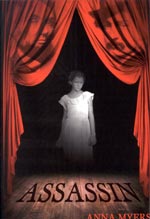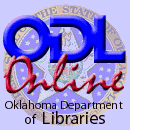

 |
 |
 |
|

2006 Oklahoma Book Award Winners

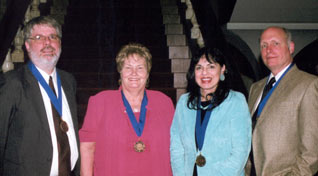 |
| 2006 Oklahoma Book Award winners: David Kent, Fiction • Anna Myers, Children/Young Adult • Leanne Howe, Poetry • Jon Goodell, Illustration • not pictured, Design winner Carol Haralson and Timothy Egan, Non-fiction winner |
Children/Young Adult
Children/Young Adult
Winner: Assassin
Anna Myers; published by Walker & Company, New York NY
“I am not evil. I tell this story so that you might understand and perhaps so that I might see more clearly.” Thus begins Anna Myers’ latest work of historical fiction. It is the story of Bella, a seamstress to Mary Todd Lincoln, who comes under the influence of charismatic actor John Wilkes Booth, the man who will become infamous for killing a president. Myers has won two Oklahoma Book Awards, and her book Tulsa Burning was selected as one of New York Public Library’s Books for the Teen Age. The author lived many years in Chandler, but now calls Tulsa home.
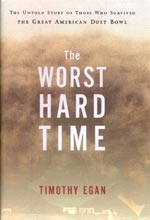 Non-Fiction
Non-Fiction
The Worst Hard Time
Timothy Egan; published by Houghton Mifflin, New York, NY
The dust storms that terrorized the high plains of Oklahoma, Texas, Kansas, Colorado and other states in the darkest days of the Great Depression were like nothing ever seen before or since. New York Times journalist and author Timothy Egan follows a half-dozen families through the rise and fall of the region, producing a story Walter Cronkite describes as “can’t-put-it-down history.” Egan has written four books and has received several awards, including the Pulitzer Prize. He lives in Seattle, Washington.
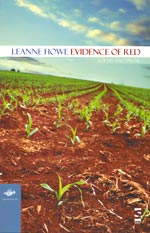 Poetry
Poetry
Evidence of Red
Leanne Howe; published by Salt Publishing, Cambridge, United Kingdom
Howe’s collection of poetry and prose is personal and multi-layered. It breaks out of the traditional Native American mold to create a new paradigm. Unique imagery, the counterpoint between the historically poignant with the cultural iconography of the present, and the unexpected humor that pops up, add up to a thoroughly original work. Howe, an enrolled member of the Choctaw Nation of Oklahoma, was raised in Oklahoma City. She is a fiction writer, playwright, journalist, scholar and poet. Her novel Shell Shaker was a finalist for the 2003 Oklahoma Book Award.
 Design and Illustration
Design and Illustration
Design Winner— Home: Native People in the Southwest
Designed by Carol Haralson; published by Heard Museum, Phoenix, AZ
Miami, Oklahoma, native Carol Haralson designed this book as a companion to an exhibit at the Heard Museum. The exhibit explored artistic expressions of Native Peoples on the meanings of home. Haralson worked professionally in Oklahoma for many years and continues to work with Oklahoma institutions and individuals on a variety of book design projects from her studio in Arizona. Her efforts have earned her more Oklahoma Book Award medals than any other OBA honoree.
 Illustration Winner— Mother, Mother, I Want Another
Illustration Winner— Mother, Mother, I Want Another
Illustrated by Jon Goodell; published by Alfred A. Knopf, New York, NY
Critically acclaimed artist Jon Goodell illustrates this new edition of Maria Polushkin Robbins’s delightful comedy of errors. When Mother Mouse tucks Baby Mouse into bed, she gives her baby a kiss. “I want another, Mother,” Baby Mouse says. And so Mother Mouse is on the hunt for another Mother to help put Baby to bed! Goodell earned a degree in fine arts from the University of Oklahoma and finds illustrating books for young readers the most rewarding work he can imagine. He lives in Norman with his family and cooks in his spare time.
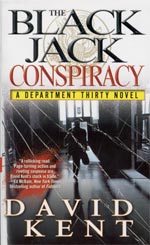 Fiction
Fiction
The Black Jack Conspiracy
David Kent; published by Pocket Books, New York, NY
Kent’s novel Department Thirty was one of the best selling
e-books of 2003. It was also the start of a series revolving around the
mysterious Department Thirty, a secret agency that erases the identities
of top-level criminals in exchange for the kind of information people
would kill for. In this third installment, Department case officer Faith
Kelly uncovers a vast conspiracy that has its roots in a notorious frontier
massacre in Oklahoma Territory. David Kent is the pen name of Kent Anderson.
Anderson grew up in Madill. He has three sons and lives in Oklahoma City.
Directors' Award
 Occasionally, the Friends of the Oklahoma Center for the Book present
a Director’s Award for a book having special merit. This year,
the Awards Committee has selected a book that exemplifies the Center
mission to promote Oklahoma authors as well as celebrate our state’s
literary heritage.
Occasionally, the Friends of the Oklahoma Center for the Book present
a Director’s Award for a book having special merit. This year,
the Awards Committee has selected a book that exemplifies the Center
mission to promote Oklahoma authors as well as celebrate our state’s
literary heritage.
The Director’s Award goes to Hidden Treasures of the American West: Muriel H. Wright, Angie Debo, and Alice Marriott written by Patricia Loughlin.
Dr. Loughlin’s book examines the literary works of Wright, Debo, and Marriott. All three writers made significant contributions to the historiography of the American Indian communities in Oklahoma and the American West, while occupying professional careers on the periphery of academia.
Arrell Gibson Lifetime Achievement Award
The Arrell Gibson Lifetime Achievement Award is presented each year to recognize a body of work. This award was named for the Norman, Okahoma historian who served as the first president of the Oklahoma Center for the Book.
 |
| Oklahoma Historian Bob Burke, Arrell Gibson Lifetime Achievement Award Recipient, 2006 |
Bob Burke, an Oklahoma City attorney and historian, is tonight’s recipient of the Arrell Gibson Lifetime Achievement Award. He has written or co-written sixty-five books about Oklahoma including Roscoe Dunjee: Champion of Civil Rights, Kate Bernard: Oklahoma’s Good Angel, Oklahoma Government Today: How We Got There, and A History of the Oklahoma Governor’s Mansion.
A native of Broken Bow, Oklahoma, Burke received a bachelor’s degree in journalism from the University of Oklahoma and a Juris Doctor degree from Oklahoma City University. He served as a journalist and sportscaster for local radio and television stations in Oklahoma before joining the American Broadcasting Company in New York. He has held numerous positions in state government including director of a large state agency during Governor David Boren’s administration.
Burke has written on such diverse topics as aviation, baseball, and religion in Oklahoma. He received the Oklahoma Book Award for non-fiction in 1999 for From Here to Eternity: The Life of Wiley Post and the Winnie Mae. His biography on Bryce Harlow was a Pulitzer Prize nominee and won the Oklahoma History Book of the Year Award from the Oklahoma Historical Society. Burke currently serves on the governing boards of the Jim Thorpe Association, Oklahoma Arts Council, Oklahoma Foundation for Excellence, and the Oklahoma Heritage Association.
George Nigh presented the Arrell Gibson Lifetime Achievement Award to Bob Burke. Nigh, a dedicated public servant, was a member of the Oklahoma House of Representatives from 1951 to 1959, and served as lieutenant governor of Oklahoma from 1959 to 1963 and again from 1967 to 1979. He was governor of Oklahoma from 1979 to 1987, and later served as University of Central Oklahoma president from 1992 to 1997. In 2000 Nigh co-authored Good Guys Wear White Hats: The Life of George Nigh with Burke. He is currently interim director of the Oklahoma Department of Tourism.
Ralph Ellison Award
From time to time, the Ralph Ellison Award, honoring a deceased Oklahoma writer, is presented. The award is named after the first recipient, Ralph Ellison, author of the ground-breaking novel Invisible Man. A list of Ellison Award recipients is listed on the Previous Winners page of this program.
A native of Pawhuska, Oklahoma, John Joseph Mathews (1895–1979), grew up among the Osage and developed a respect and admiration for his native people. One of his earliest recollections as a child was hearing an Osage Indian prayer-chant to the morning star. Following his service in the United States Air Force during World War I, Mathews returned to Oklahoma and received a bachelor’s degree in geology from the University of Oklahoma. He graduated from Oxford University in 1923, as one of the school’s first graduates with Native American heritage. Mathews later worked as a realtor in California, until he became a rancher and began devoting his time to writing.
Mathews authored both fiction and non-fiction books. His work focused primarily on southwestern history and particularly the Osage Indians. He became one of the early writers to be concerned with the loss of traditional Native American culture. His books include Wah’Kon-Tah: The Osage and the White Man’s Road, Talking to the Moon, Life and Death of an Oilman: The Career of E.W. Marland, and The Osages: Children of the Middle Waters. His novel, Sundown, is somewhat autobiographical. The book’s main character is Challenge Windzor, a young man born and raised on an Oklahoma reservation, who has difficulty blending his Indian heritage and white culture.
Throughout his life, Mathews continued to preserve the history of the Osage people and their culture. He served as a member of the Osage Tribal Council from 1934 to 1942, and played an integral role in the development of the Osage Tribal Museum in Pawhuska. He died in June 1979. The Oklahoma Historical Society honored Mathews for his work in preserving the history of Oklahoma and the Osage people by posthumously inducting him into the Oklahoma Historians Hall of Fame.
Harvey Payne, a friend and admirer of John Joseph Mathews, presented the Ralph Ellison Award. Payne, an attorney as well as a devoted environmentalist, serves as director of the Tall Grass Prairie Preserve in Oklahoma, where he diligently works to maintain protection of the 40,000 acre preserve. In 1991 he received the Chevron Conservation Award, and has been recognized by the Oklahoma Wildlife Federation with the At Large Conservation Award. An accomplished nature and wildlife photographer, Payne’s photographs have appeared in publications nationwide. More than one hundred of his prairie photographs are on permanent display at a Smithsonian exhibit on prairies at the National Zoo in Washington, DC. Payne maintains a private law practice in Pawhuska, Oklahoma.
Virginia Mathews, daughter of John Joseph Mathews, accepted the Ralph Ellison Award for her father. She is a longtime member of the American Library Association, and was elected an Honorary Life Member in 1994. Mathews has spent her professional life of nearly fifty years as a writer, editor, speaker, project director, and advocate for literacy and libraries, especially service to children.
![]()
To see complete list of 2006 Oklahoma Book Award Finalists go here.
![]()
The Oklahoma Center for the Book, sponsor of the Oklahoma Book Award competition, is a nonprofit, 501-c-3 organization located in the Oklahoma Department of Libraries. Established in 1986 as an outreach program of the Library of Congress, the Oklahoma Center was the fourth such state center formed.
The mission of the Oklahoma Center for the Book is
![]() to promote the
work of Oklahoma authors,
to promote the
work of Oklahoma authors,
![]() to promote the
literary heritage of the state, and
to promote the
literary heritage of the state, and
![]() to encourage reading
for pleasure by Oklahomans of all ages.
to encourage reading
for pleasure by Oklahomans of all ages.
For further information about the Oklahoma Center for the Book or the Oklahoma Book Award program, contact Connie Armstrong, 200 NE 18th Street, Oklahoma City, Oklahoma, 73105; or call 1-800-522-8116 toll free, statewide. In the Oklahoma City metropolitan area, call 522-3383.
![]()
Copyright © - All Rights Reserved
Oklahoma Department of Libraries
